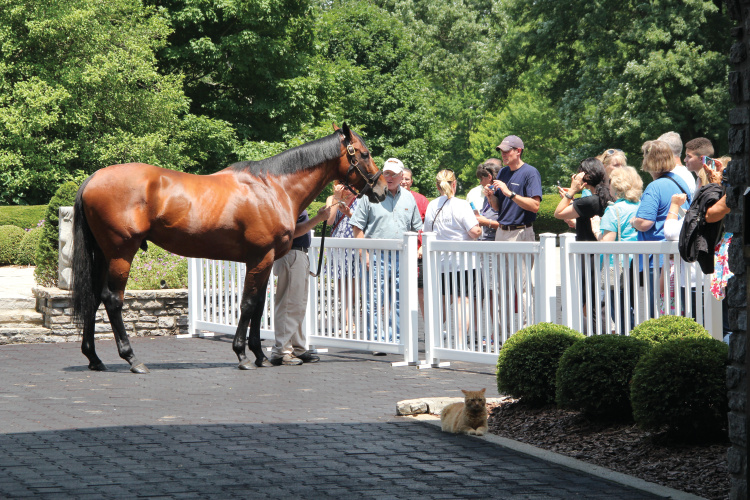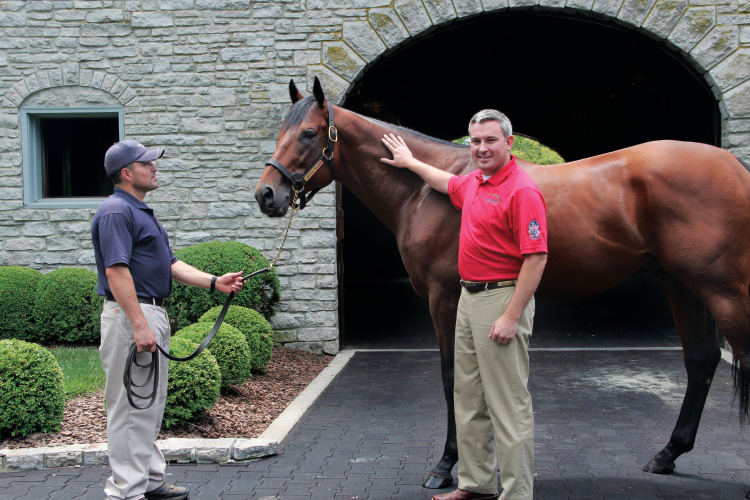Home > Kentucky > Kentucky Crops & Livestock > Kentucky Born and Bred Equine
Kentucky Born and Bred Equine

What does the term “Kentucky thoroughbred” mean to anyone outside the Bluegrass State?
“The fastest racehorses in the world.”
Chauncey Morris gets paid to say that. He’s executive director of the Kentucky Thoroughbred Association/Kentucky Thoroughbred Owners and Breeders. But he is not wrong.
Morris says nearly half of all the thoroughbred broodmares bred in North America are bred in Kentucky. More Kentucky Derby winners were born in Kentucky than in the rest of the world combined. The Kentucky Legislative Research Commission found that the thoroughbred industry accounted for 17,600 direct and indirect jobs and $352.7 million in earnings in 2010.
The 2012 Equine Survey, conducted by the University of Kentucky and the Kentucky Horse Council in conjunction with the National Agricultural Statistics Service, reported that Kentucky was home to 242,000 horses of all breeds on 35,000 equine farm operations. The survey says the equine industry had a total economic impact of almost $3 billion and generated 40,665 jobs in 2012.
Horse Capital of the World
Agriculture Commissioner Ryan Quarles recently met the cream of the 2012 thoroughbred crop – Triple Crown winner American Pharoah, who stands at stud at Coolmore’s Ashford Stud near Versailles. Commissioner Quarles pointed out that Kentucky’s equine industry generates economic activity in related agricultural industries, such as feed, fencing, and veterinary services.
“Kentucky is, without question, the horse capital of the world,” Commissioner Quarles says. “We have the biggest race of the year, the top thoroughbred auction house, and many of the world’s leading stallions and broodmares. The Kentucky Department of Agriculture is committed to working with all our equine breed industries to keep our horse industry growing.”
Fans, owners, trainers, and breeders at the races can identify Kentucky-bred horses at a glance by the Kentucky Proud logo beside their names in the track program. The initiative was launched in 2013 with the Kentucky-bred horses in that year’s Kentucky Derby and Kentucky Oaks.
The Office of the State Veterinarian, a unit of the KDA, is responsible for preventing foreign animal disease from entering Kentucky’s livestock, poultry, and equine herds, and for containing and eliminating a disease outbreak when one occurs. Morris praises the Kentucky state vet’s office and says its work is “hugely important” to Kentucky’s equine industry.
“There’s no more important role in Kentucky than making sure the thoroughbred herd that’s in training and on the farms is disease-free,” Morris says. “The alternative of that would be a catastrophic economic loss to the Commonwealth.”
“The equine industry is a vital part of Kentucky agriculture,” Quarles says. “We will do everything we can to protect our industry and help our horse operations grow and prosper.”

American Pharoah: Why the Name?
American Pharoah’s name is inspired by his sire’s name, Pioneerof the Nile (which is correctly spelled) and his dam’s sire, Yankee Gentleman. The name also acknowledges his owner’s Egyptian-American background. But why the misspelling of “pharaoh?” Simply put: It was a mistake.
There are many stories about how the champion thoroughbred got his misspelled name, but the most simple and commonly believed is owner Ahmed Zayat’s son hosted a social media contest in which fans could submit names for the new horse. The winning entry had “Pharaoh” misspelled, and that was the version that was sent to The Jockey Club for official registration.
The Zayats – and Kentuckians – embraced the error, and The Jockey Club has since reserved both spellings of pharaoh so that no other horse can use the name.




i want to be a vet when i get older
i want to be a buisness man when i grow up
real